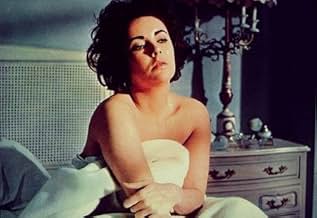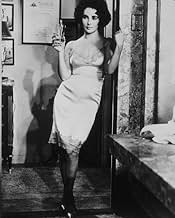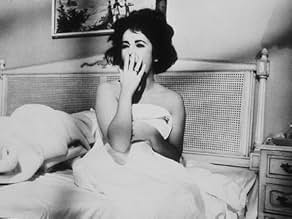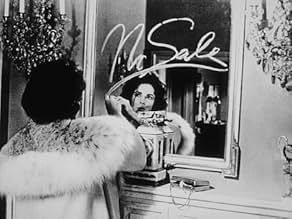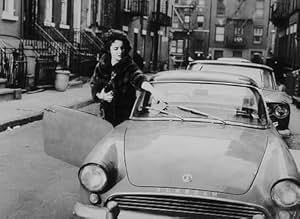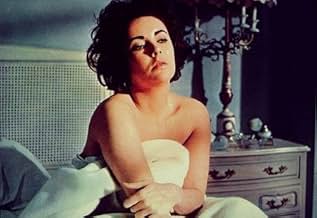PUNTUACIÓN EN IMDb
6,3/10
7,8 mil
TU PUNTUACIÓN
Una prostituta de Manhattan tiene una trágica aventura con un rico hombre casado.Una prostituta de Manhattan tiene una trágica aventura con un rico hombre casado.Una prostituta de Manhattan tiene una trágica aventura con un rico hombre casado.
- Dirección
- Guión
- Reparto principal
- Ganó 1 premio Óscar
- 1 premio y 6 nominaciones en total
Tom Ahearne
- Tom the Bartender
- (sin acreditar)
John Armstrong
- Doorman
- (sin acreditar)
Dan Bergin
- Elevator Man
- (sin acreditar)
Joseph Boley
- Messenger
- (sin acreditar)
Don Burns
- Photographer
- (sin acreditar)
Whitfield Connor
- Anderson
- (sin acreditar)
Reseñas destacadas
On the surface, Taylor was all sex and devil-may-care
Everything in her was struggling toward respectability
She never gave up trying
The film concerns her fashionable life which is part model, part call-girland all man-trap
Her performance is one of her best and was nominated for her third Academy Award
Her remarkable scene is her confession to Eddie Fisher about how she got started in the life: she was seduced by a house guest when she was thirteen, and she liked it! She has always 'liked' it! Emotionally, she dominates the screen at this moment and her serious attitude simply fills it up
Filmed in and around New York, "Butterfield 8" is an intimate portrait of a tormented woman daringly beautiful and sexy
Her remarkable scene is her confession to Eddie Fisher about how she got started in the life: she was seduced by a house guest when she was thirteen, and she liked it! She has always 'liked' it! Emotionally, she dominates the screen at this moment and her serious attitude simply fills it up
Filmed in and around New York, "Butterfield 8" is an intimate portrait of a tormented woman daringly beautiful and sexy
`The most desirable girl in town is the easiest to find. Just call Butterfield-8!' So trumpeted the posters of this, Elizabeth Taylor's first Oscar winning performance. The film is a modernization of the 1935 novel by John O'Hara, which was based on the real life of the 1920's New York City call girl Starr Faithful.
Miss Taylor was dead set against playing Gloria Wandrous. She felt was a deliberate play by M.G.M. to capitalize on her recent notoriety in the Liz-Eddie-Debbie scandal. Also, she was anxious to move on to her first ever million-dollar role in Fox's Cleopatra. She was told by M.G.M that if she did not fulfill her contractual obligation to her home studio for one final film on her eighteen year contract that she would be kept off the screen for two years and miss making Cleopatra all together. She swore to the producer Pandro S. Berman that she would not learn her lines, not be prepared and in fact not give anything more and a walk through. Mr. Berman knew her better than she suspected. In the end Elizabeth Taylor turned in a professional, classic old style Hollywood performance that ranks at the top with the best of her work. She brings a savage rage to live to her searing portrait of a lost girl soaked through with sex and gin. A woman hoping against all hope to find salvation in yet one last man. Weston Leggett, a man who is worse off than she is in the self-esteem department. In her frantic quest for a clean new life Gloria finds that the male establishment will not allow her to step out of her role as a high priced party girl. She is pigeon holed by her past and the narrow mores of the late 50's are not about to let her fly free. Not the bar-buzzards of Wall Street, not her best friend Steve who abandons her at his girlfriend's insistence. Not even her shrink Dr. Treadman believes in her. The three women in her life are blind to who she really is. Her mother will not admit what Gloria has become. Mrs. Thurber will not believe she can ever change and Happy, the motel proprietor is too self involved in her own past to care who Gloria is She is the dark Holly Golightly and this is the lurid red jelled Metro-Color Manhattan that is the flip side of Billy Wilder's The Apartment (also 1960). Wilder's New York is cynical. Liz's tony East Side phone exchange rings only one way, the hard way. This New York is dammed. Recrimination and death are Gloria's final tricks, and she goes out in a melodramatic blaze that Douglas Sirk might have envied in place of his usually unsettling, unconvincing happy endings. In the end we have a bravura performance by the last true star of the old system. Yes she deserved the Oscar more for `Cat'. Yes it was given to welcome her back from the brink of death in London. And even Shirley MacLaine's lament on Oscar night, `I lost the Oscar to a tracheotomy.' can not diminish this must see performance by Miss Taylor.
In what one could call a perfect example of what an `Oscar scene' is all about she says it all. `I loved it! Every awful moment of it I loved. That's your Gloria, Steve. That's your precious Gloria!' She gave it to us with both barrels blazing, and Metro, and Berman be dammed.
Miss Taylor was dead set against playing Gloria Wandrous. She felt was a deliberate play by M.G.M. to capitalize on her recent notoriety in the Liz-Eddie-Debbie scandal. Also, she was anxious to move on to her first ever million-dollar role in Fox's Cleopatra. She was told by M.G.M that if she did not fulfill her contractual obligation to her home studio for one final film on her eighteen year contract that she would be kept off the screen for two years and miss making Cleopatra all together. She swore to the producer Pandro S. Berman that she would not learn her lines, not be prepared and in fact not give anything more and a walk through. Mr. Berman knew her better than she suspected. In the end Elizabeth Taylor turned in a professional, classic old style Hollywood performance that ranks at the top with the best of her work. She brings a savage rage to live to her searing portrait of a lost girl soaked through with sex and gin. A woman hoping against all hope to find salvation in yet one last man. Weston Leggett, a man who is worse off than she is in the self-esteem department. In her frantic quest for a clean new life Gloria finds that the male establishment will not allow her to step out of her role as a high priced party girl. She is pigeon holed by her past and the narrow mores of the late 50's are not about to let her fly free. Not the bar-buzzards of Wall Street, not her best friend Steve who abandons her at his girlfriend's insistence. Not even her shrink Dr. Treadman believes in her. The three women in her life are blind to who she really is. Her mother will not admit what Gloria has become. Mrs. Thurber will not believe she can ever change and Happy, the motel proprietor is too self involved in her own past to care who Gloria is She is the dark Holly Golightly and this is the lurid red jelled Metro-Color Manhattan that is the flip side of Billy Wilder's The Apartment (also 1960). Wilder's New York is cynical. Liz's tony East Side phone exchange rings only one way, the hard way. This New York is dammed. Recrimination and death are Gloria's final tricks, and she goes out in a melodramatic blaze that Douglas Sirk might have envied in place of his usually unsettling, unconvincing happy endings. In the end we have a bravura performance by the last true star of the old system. Yes she deserved the Oscar more for `Cat'. Yes it was given to welcome her back from the brink of death in London. And even Shirley MacLaine's lament on Oscar night, `I lost the Oscar to a tracheotomy.' can not diminish this must see performance by Miss Taylor.
In what one could call a perfect example of what an `Oscar scene' is all about she says it all. `I loved it! Every awful moment of it I loved. That's your Gloria, Steve. That's your precious Gloria!' She gave it to us with both barrels blazing, and Metro, and Berman be dammed.
In the normal scheme of things, lofty MGM wouldn't have touched John O'Hara's novel with a ten foot pole--but shortly before her contract was to end, MGM star Elizabeth Taylor besmirched her image by running off with Debbie Reynolds' husband Eddie Fisher. With her reputation in shreds and one foot outside the studio gate any way, MGM decided to capitalize on the bad press by casting Taylor as BUTTERFIELD 8's bad-girl-from-hell... and then, to add insult to injury, tucked Eddie Fisher into a supporting role and cast Debbie Reynolds look-alike Susan Oliver in the role of Eddie's girl friend, who feels threatened by Liz's manhungry ways. Liz fought the project tooth and nail, but MGM was adamant: she owed them another film, and she wasn't leaving until she made it.
BUTTERFIELD 8 is the story of Gloria Wandrous (Taylor), a hard-drinking, sexed-up, bed-hopping dress model who gets her kicks by seducing and then dumping men according to whim--until she encounters an unhappily married man just as hard and disillusioned as she in Weston Liggett (Laurence Harvey.) Although the production code was still somewhat in force, it had loosened up quite a bit since the days of NATIONAL VELVET, and while scenes stop short at the bedroom door they have plenty of sizzle while they walk up to it; moreover, every one in the film talks about sex so much you'd think it had just been invented. Taylor is on record saying that she considers the film a piece of trash, and she swears she has never actually seen it, that she would rather die than ever see it.
But something weird happened as the camera rolled. Taylor, doubtlessly driven by her fury at having to do the movie, gives a throw-away, over-the-top performance--but perversely, this is precisely what the role requires, and her performance was successful enough to earn her an Oscar. The supporting cast follows her lead, all of them performing in broad colors and bigger-than-life emotions, and again they too are quite successful, with Laurence Harvey and Dina Merrill (as his long suffering wife) particularly effective. Ultimately, of course, Elizabeth Taylor is quite right when she says the film is a piece of trash. But it is the best kind of trash because it is so completely trashy: BUTTERFIELD 8 doesn't just dive into the trash pile, it wallows in it with considerable conviction. Modern films of the same type may show more skin and more sex, but for sheer authority BUTTERFIELD 8 remains a standard against which most of them pale. Not every one will like it, but I recommend it all the same.
Gary F. Taylor, aka GFT, Amazon Reviewer
BUTTERFIELD 8 is the story of Gloria Wandrous (Taylor), a hard-drinking, sexed-up, bed-hopping dress model who gets her kicks by seducing and then dumping men according to whim--until she encounters an unhappily married man just as hard and disillusioned as she in Weston Liggett (Laurence Harvey.) Although the production code was still somewhat in force, it had loosened up quite a bit since the days of NATIONAL VELVET, and while scenes stop short at the bedroom door they have plenty of sizzle while they walk up to it; moreover, every one in the film talks about sex so much you'd think it had just been invented. Taylor is on record saying that she considers the film a piece of trash, and she swears she has never actually seen it, that she would rather die than ever see it.
But something weird happened as the camera rolled. Taylor, doubtlessly driven by her fury at having to do the movie, gives a throw-away, over-the-top performance--but perversely, this is precisely what the role requires, and her performance was successful enough to earn her an Oscar. The supporting cast follows her lead, all of them performing in broad colors and bigger-than-life emotions, and again they too are quite successful, with Laurence Harvey and Dina Merrill (as his long suffering wife) particularly effective. Ultimately, of course, Elizabeth Taylor is quite right when she says the film is a piece of trash. But it is the best kind of trash because it is so completely trashy: BUTTERFIELD 8 doesn't just dive into the trash pile, it wallows in it with considerable conviction. Modern films of the same type may show more skin and more sex, but for sheer authority BUTTERFIELD 8 remains a standard against which most of them pale. Not every one will like it, but I recommend it all the same.
Gary F. Taylor, aka GFT, Amazon Reviewer
... and just a few years away from the production code being dumped altogether it seems like a demonstration of what was the worst about the code years combined with films in the 60s trying to use what shock value they could get away with, and today , overall, it just looks cheesy.
In most summaries of this film I see Elizabeth Taylor's character, Gloria, described as a call girl. I never really see that happening. Instead Gloria just seems to like sex a lot. As in lots of sex with lots of men. Maybe to come out and say that when the goal of all women was still supposed to be having dishpan hands was going too far.
Gloria wakes up one morning in the apartment of wealthy but married playboy Weston Liggitt (Laurence Harvey), with him having left behind a note with $250 asking "Is this enough". She writes "no sale" in the mirror and takes a mink coat she finds in the closet - only to teach the guy a lesson for assuming she is for sale, but as they get more involved and do so immediately, she forgets all about that coat, and that causes a huge misunderstanding down the line.
The title comes from Gloria's answering service which is "Butterfield 8", and it is the subject of some - today - howlingly unintentionally funny scenes as Liggitt pleads with these people to find Gloria, curses at these people because they don't know where Gloria is, thanks them when they do find her. Gee, fellow, these are just operators eking out a living. They don't know their clients and they don't know you!
With Liz' husband at the time, Eddie Fisher, as a musician who has been Gloria's platonic friend since childhood and who also has a jealous girlfriend who oddly enough looks like Debbie Reynolds. There are some great location shots on the road between New York and Boston with the little independent diners and hotels that once dotted that landscape. I'd mildly recommend it.
An aside - Jeffrey Lynn, once strangely promoted as a romantic leading man over at Warner Brothers just before WWII, does a good job in a small role as Liggitt's friend.
In most summaries of this film I see Elizabeth Taylor's character, Gloria, described as a call girl. I never really see that happening. Instead Gloria just seems to like sex a lot. As in lots of sex with lots of men. Maybe to come out and say that when the goal of all women was still supposed to be having dishpan hands was going too far.
Gloria wakes up one morning in the apartment of wealthy but married playboy Weston Liggitt (Laurence Harvey), with him having left behind a note with $250 asking "Is this enough". She writes "no sale" in the mirror and takes a mink coat she finds in the closet - only to teach the guy a lesson for assuming she is for sale, but as they get more involved and do so immediately, she forgets all about that coat, and that causes a huge misunderstanding down the line.
The title comes from Gloria's answering service which is "Butterfield 8", and it is the subject of some - today - howlingly unintentionally funny scenes as Liggitt pleads with these people to find Gloria, curses at these people because they don't know where Gloria is, thanks them when they do find her. Gee, fellow, these are just operators eking out a living. They don't know their clients and they don't know you!
With Liz' husband at the time, Eddie Fisher, as a musician who has been Gloria's platonic friend since childhood and who also has a jealous girlfriend who oddly enough looks like Debbie Reynolds. There are some great location shots on the road between New York and Boston with the little independent diners and hotels that once dotted that landscape. I'd mildly recommend it.
An aside - Jeffrey Lynn, once strangely promoted as a romantic leading man over at Warner Brothers just before WWII, does a good job in a small role as Liggitt's friend.
Elizabeth Taylor hated making this movie (forced on her by MGM to fulfill the last part of her contract with the studio dating back to her days as a child star), and she hates it still. But whereas a lesser performer would have channeled that hatred into not trying at all on screen, La Liz instead channeled her hatred of the project by playing her part of call-girl Gloria Wandrous to the hilt, and in the process richly earned her first Academy Award (it is a far better performance than Shirley MacLaine's in "The Apartment", her chief competition that year). The story is cheap soap opera that really makes one snicker today when you see how they had to dance around the Production Code restraints of the day like never before, but watching La Liz in action is spellbinding. No other part reveals how in her prime she was the total picture of stunning beauty *and* a talented, gifted actress to boot.
¿Sabías que...?
- CuriosidadesDame Elizabeth Taylor and her husband, Mike Todd, had planned for La gata sobre el tejado de zinc (1958) to be her final movie, as she intended to retire from the screen. Todd had made a verbal agreement about this with MGM, but after his death, MGM forced Taylor to make this movie in order to fulfill the terms of her studio contract. As a result, Taylor refused to speak to director Daniel Mann for the entire production and hated this movie.
- PifiasA crew member's arm is visible in the mirror when Liggett stands before it and is supposedly alone.
- Citas
Tom, the Bartender: Without her this place is dead. She's like catnip to every cat in town.
- ConexionesEdited into Voskovec & Werich - paralelní osudy (2012)
Selecciones populares
Inicia sesión para calificar y añadir a tu lista para recibir recomendaciones personalizadas
Detalles
- Fecha de lanzamiento
- País de origen
- Sitio oficial
- Idioma
- Títulos en diferentes países
- Una venus en visón
- Localizaciones del rodaje
- Tappan Zee Bridge, Tarrytown, Nueva York, Estados Unidos(when Gloria flees Liggett at the end)
- Empresa productora
- Ver más compañías en los créditos en IMDbPro
Taquilla
- Presupuesto
- 2.800.000 US$ (estimación)
- Recaudación en todo el mundo
- 8722 US$
- Duración1 hora 49 minutos
- Color
- Relación de aspecto
- 2.35 : 1
Contribuir a esta página
Sugerir un cambio o añadir el contenido que falta

Principal laguna de datos
What is the streaming release date of Una mujer marcada (1960) in Brazil?
Responde

